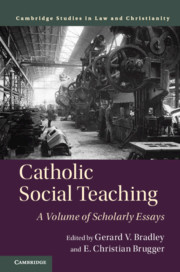Book contents
- Catholic Social Teaching
- Law and Christianity
- Frontispiece
- Catholic Social Teaching
- Copyright page
- Dedication
- Contents
- Contributors
- Acknowledgments
- Abbreviations
- Introduction Contingency, Continuity, Development, and Change in Modern Catholic Social Teaching
- Part I Historical Background
- Part II Leo XIII to Francis: The Documentary Tradition
- Part III Themes in Catholic Social Teaching
- 10 Catholic Social Teaching on the Common Good
- 11 The Universal Destination of the World’s Resources
- 12 The Apostolate of the Laity
- 13 Globalization
- 14 Are Some Men Angels? Modern Catholic Social Thought and Trust in Government
- 15 The Moral Principles Governing the Immigration Policies of Polities
- 16 International Finance and Catholic Social Teaching
- 17 Subsidiarity
- 18 Socialism and Capitalism in Catholic Social Thought
- 19 The Preferential Option for the Poor and Catholic Social Teaching
- 20 Catholic Social Teaching and Living the Christian Life
- Part IV Evaluative and Critical Reflections
- Bibliography
- Index of Names and Subjects
- Index of Ecclesiastical Texts
14 - Are Some Men Angels? Modern Catholic Social Thought and Trust in Government
from Part III - Themes in Catholic Social Teaching
Published online by Cambridge University Press: 12 July 2019
- Catholic Social Teaching
- Law and Christianity
- Frontispiece
- Catholic Social Teaching
- Copyright page
- Dedication
- Contents
- Contributors
- Acknowledgments
- Abbreviations
- Introduction Contingency, Continuity, Development, and Change in Modern Catholic Social Teaching
- Part I Historical Background
- Part II Leo XIII to Francis: The Documentary Tradition
- Part III Themes in Catholic Social Teaching
- 10 Catholic Social Teaching on the Common Good
- 11 The Universal Destination of the World’s Resources
- 12 The Apostolate of the Laity
- 13 Globalization
- 14 Are Some Men Angels? Modern Catholic Social Thought and Trust in Government
- 15 The Moral Principles Governing the Immigration Policies of Polities
- 16 International Finance and Catholic Social Teaching
- 17 Subsidiarity
- 18 Socialism and Capitalism in Catholic Social Thought
- 19 The Preferential Option for the Poor and Catholic Social Teaching
- 20 Catholic Social Teaching and Living the Christian Life
- Part IV Evaluative and Critical Reflections
- Bibliography
- Index of Names and Subjects
- Index of Ecclesiastical Texts
Summary
Catholic social thought has always emphasized that the state or government plays an essential role in political, social, and economic life, but government’s role has been increasingly emphasized since 1960. Trends in modern secular thought and political practice that have placed a greater emphasis on government solutions to social problems and are less inclined toward other (and especially free market) solutions, may be one factor in this increased emphasis. As CST has embraced the idea of more active government, it has always qualified that embrace with important limits, some of which are discussed. But in this chapter I ask, “To what extent has CST considered the possibility of government abusing its expanded powers to regulate?” and “What suggestions does it offer for dealing with such abuses?” The answer to both questions is, I suggest, “Not enough.” The primary point I make is not that CST ought to adopt a particular stance regarding the specific institutional limits on government that should be employed, or how much government power ought to be limited, but rather that it is a significant gap in CST that it barely considers this issue at all.
Keywords
- Type
- Chapter
- Information
- Catholic Social TeachingA Volume of Scholarly Essays, pp. 345 - 364Publisher: Cambridge University PressPrint publication year: 2019



